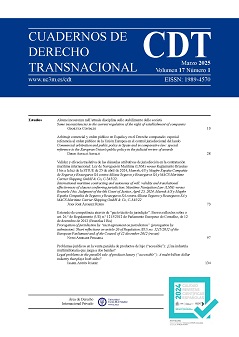Elaboración y significado de la reforma del Título Preliminar del Código Civil de 1974 en el Derecho internacional privado español
DOI:
https://doi.org/10.20318/cdt.2025.9352Palabras clave:
Codificación, Derecho internacional privado, Título Preliminar, Código Civil, Ley especial, armonización, modernización, fragmentación, europeización, reforma integralResumen
La reforma de 1974 del Título Preliminar del Código Civil español, al introducir por primera vez normas específicas de Derecho internacional privado (DIPr), constituyó un paso significativo, aunque insuficiente, hacia la modernización de este ordenamiento. Concebida en un contexto político y social poco favorable, la reforma se limitó esencialmente a las cuestiones de ley aplicable, dejando al margen aspectos fundamentales como la competencia judicial internacional o el reconocimiento y ejecución de decisiones extranjeras. Esta opción, inspirada en tradiciones decimonónicas y en el modelo savigniano de atribución, dio lugar a un sistema rígido, con conexiones únicas, y mantuvo criterios antiguos como el de la nacionalidad en materias personales y familiares. Además, pese a la introducción de la noción de residencia habitual y la presencia de algunas cláusulas correctivas, el sistema resultó desfasado frente a las necesidades del tráfico jurídico internacional contemporáneo.
Con la llegada de la Constitución de 1978, la intensa actividad codificadora internacional y la integración europea, el panorama del DIPr español se transformó radicalmente. La Constitución exigió adaptar las normas a principios como la igualdad, repercutiendo en las conexiones discriminatorias que subsistían, y estimuló la protección de menores y la conciliación entre el principio de seguridad jurídica y la justicia material. Simultáneamente, la progresiva incorporación masiva de tratados internacionales y reglamentos de la Unión Europea diluyeron el protagonismo del Capítulo IV del Título Preliminar, que fue quedando rezagado y fragmentado ante la emergencia de fuentes internacionales y comunitarias. Esta evolución generó un “polisistema” complejo, en el que las normas internas del DIPr se conjugan con instrumentos internacionales y europeos, provocando dispersión normativa y dificultando la labor de operadores jurídicos y jueces, quienes deben identificar primero la norma pertinente de entre múltiples fuentes.
La situación actual pone de manifiesto la discusión acerca de la conveniencia de emprender una nueva reforma integral del DIPr español. Lejos de crear un ordenamiento radicalmente nuevo, se trataría de articular un marco general capaz de dotar al sistema de mayor coherencia, claridad y flexibilidad. Resultaría recomendable optar por una Ley Especial de DIPr, al estilo de otros países europeos y latinoamericanos, que sistematice las normas dispersas, las complemente y establezca conexiones más modernas, reconociendo la autonomía del DIPr respecto del Derecho interno. En caso afirmativo, esta ley debería tener un diseño tripartito contemplando conjuntamente competencia judicial internacional, ley aplicable y reconocimiento de decisiones extranjeras, permitiendo así una visión unitaria, materialmente orientada a la obtención de resultados justos y eficaces. Además, la ley debería armonizarse con las tendencias de unificación y comunitarización seguidas en la Unión Europea, integrando sinergias con el Derecho derivado de la UE y reconociendo la primacía de los instrumentos internacionales.
La experiencia de otros Estados y la propia evolución del ordenamiento español apuntan a que, pese a la europeización y las limitaciones de la acción legislativa nacional, una reforma integral del DIPr mediante una ley especial continúa siendo valiosa. Un texto coherente, sólido, adaptable y alineado con los valores constitucionales, el Derecho internacional y el comunitario, dotaría a España de las herramientas necesarias para afrontar las complejas demandas del tráfico jurídico internacional contemporáneo, superando la rigidez y fragmentación heredadas del modelo de 1974. De este modo, el DIPr español se modernizaría sin abandonar su raíz nacional, sirviendo como referencia para futuros desarrollos en un contexto cada vez más globalizado.
